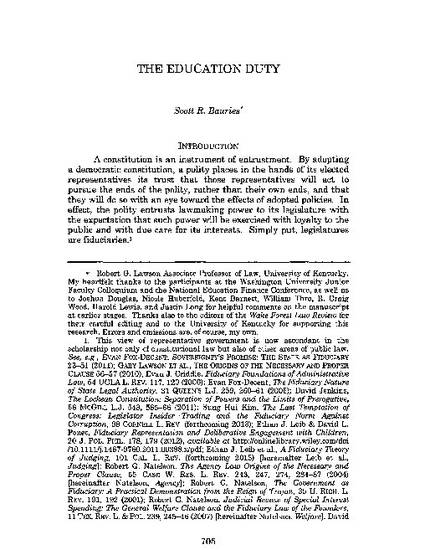
A constitution is an instrument of entrustment. By adopting a democratic constitution, a polity places in the hands of its elected representatives its trust that those representatives will act to pursue the ends of the polity, rather than their own ends, and that they will do so with an eye toward the effects of adopted policies. In effect, the polity entrusts lawmaking power to its legislature with the expectation that such power will be exercised with loyalty to the public and with due care for its interests. Simply put, legislatures are fiduciaries.
In this Article, I examine the nature of the fiduciary duties that state constitutions place on state legislatures. Generally, I develop the concepts of legislative duties of loyalty and care and propose principles for the enforcement of these duties. Specifically, I consider how these duties might function in the context of the affirmative obligations that state constitutions place on state legislatures to pursue certain policy goals. Ultimately, I present the case that specific affirmative duties placed upon legislatures by state constitutions are governed by general fiduciary duties, and that they ought to be adjudicated as such, using the tools of deference appropriate to the review of discretionary decisions by individuals in positions of trust.
One policy area in which every state constitution imposes specific affirmative obligations is education, and education is the one area in which courts in nearly all American states have been asked to enforce such affirmative obligations. Accordingly, I focus my analysis on what I term "the education duty." I define the duty as a mandatory specific obligation of the state legislature, which also carries with it a general duty of care. Contrary to the existing scholarship and case law, I argue that, although the education duty in each state's constitution should be subject to judicial enforcement, the proper focus of judicial review should be the general duty of care imposed by each state's constitution, rather than the nebulous qualitative terms contained in each state's education clause. Approaching enforcement as an application of the qualitative terms in the education clause has resulted in both overenforcement and underenforcement of the education duty. Moving the focus of judicial review to the underlying duty of care will remedy both of these problems and preserve a role for the judiciary in ensuring the legislature's performance of its constitutional obligations, while also protecting the separation of powers in state governments.
This Article proceeds in three subsequent Parts. Part I sets the stage for the discussion that follows by distinguishing between negative and positive constitutional rights, and further distinguishing between positive constitutional rights and duties, as discussed in the constitutional law cases and scholarship. Part II then sets about identifying and defining a duty-based approach to constitutional analysis, focusing on the provisions in every state constitution mandating the legislative provision of a system of education. Drawing from the history and political theory underlying constitutionalism in the United States, from the current texts of the fifty state constitutions and from the history of litigation over these provisions, I establish that state legislative duties in general, and affirmative legislative duties in particular, are fiduciary duties to the public as a whole. I ultimately develop a conception of the fiduciary foundations of the legislative duty to provide for education.
In Part III, I then outline how state courts might alter their approaches to enforcement of the education duty and other similar duties to reflect these fiduciary foundations. Ultimately, I conclude that a fiduciary duty-based approach to affirmative constitutional provisions will allow for enforcement without institutional encroachment and will provide the necessary space for a principled consideration of whether individual rights to education and other public services exist and whether they are enforceable.

Wake Forest Law Review, Vol. 47, No. 4 (2012), pp. 705-768